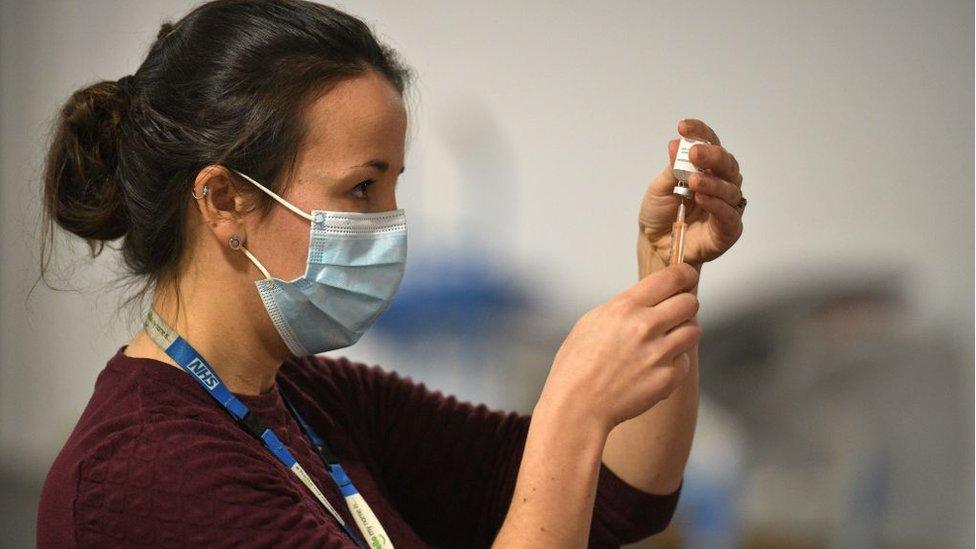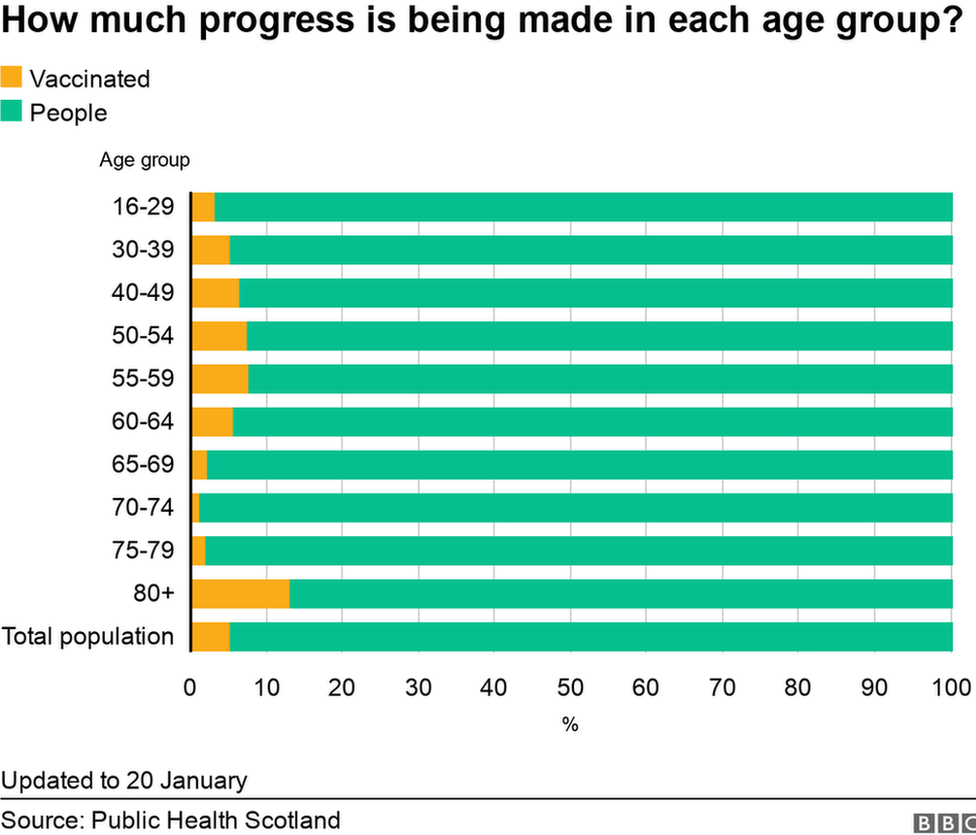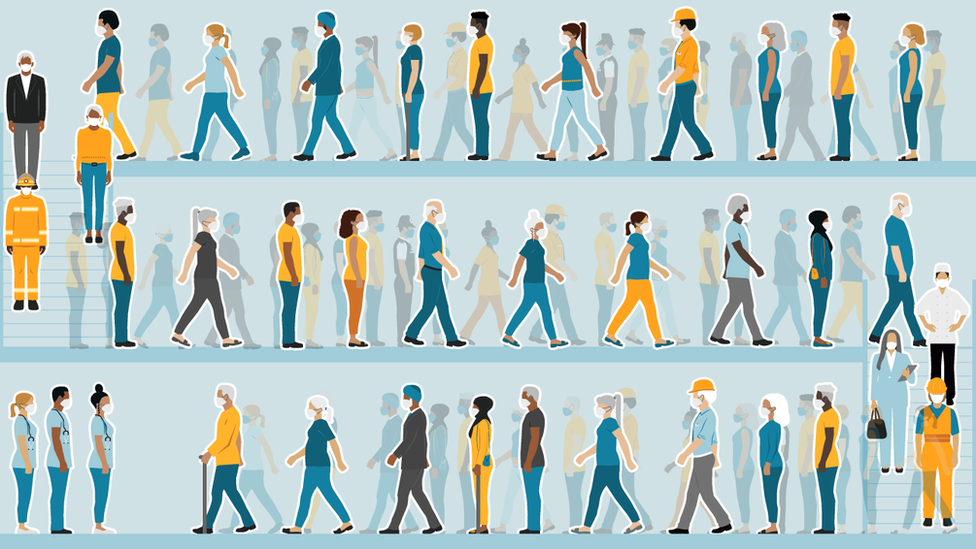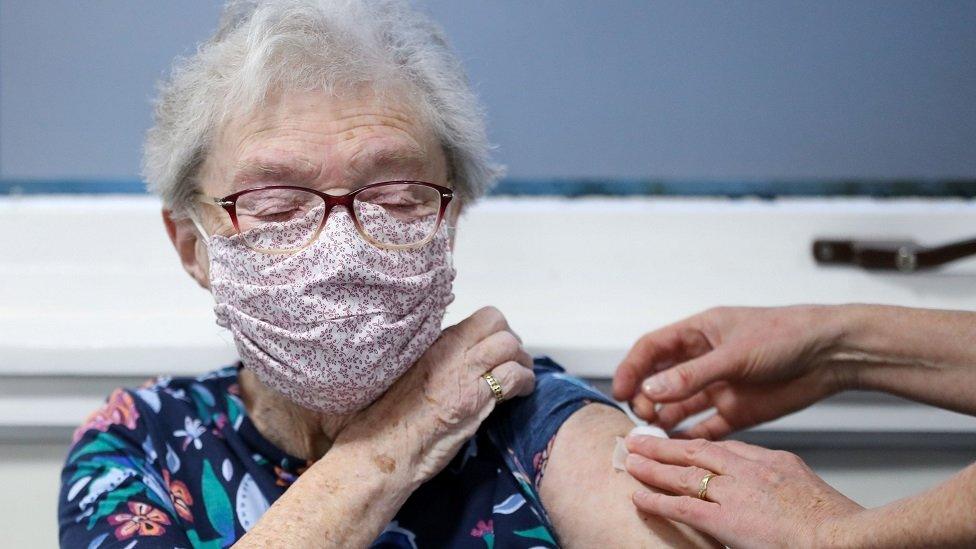Covid in Scotland: Over-70 vaccine letters start but blue envelope delay
- Published
- comments

Vaccination appointments for people aged 70-79 are being delivered from Monday - but plans to use distinctive blue envelopes in some parts of the country have been delayed.
The aim is to have this group receive their first dose by mid-February.
On Sunday morning, the Scottish government said some letters would be sent out in blue envelopes and given Royal Mail priority.
But in a statement published later it said the envelopes were not yet ready.
It added that the change has no impact on the vaccination programme timetable.
Vaccinations for over-80s are continuing, with Nicola Sturgeon revealing on Sunday that about 40% of this age group had received a first dose of the vaccine.
All appointments will initially be sent out in white envelopes which will have a window and a black NHS logo on the right hand side.
The blue envelopes were due to be sent out in Fife, Forth Valley, Ayrshire and Arran, Lanarkshire, Greater Glasgow and Clyde, and Lothian as part of a new booking system.
Under the system, patients are scheduled in order of priority and more boards are expected to make use of the technology as the vaccination programme expands.
A Scottish government spokesman said the blue envelopes would be introduced "as quickly as possible".
He added: "The blue envelopes we hoped to use were not ready in time for the first tranche of vaccine appointment invitations so distinctive NHS branded white envelopes are being used as a temporary measure.
"The absolute priority remains the roll-out of vaccinations and this temporary change to the envelope colour has absolutely no impact to our timetable.
"We continue to strongly urge everyone in the 70-79 age group to check all their post in the coming weeks and take up the offer of the vaccine when it is received," he added.
'Clearly marked envelopes'
According to the Scottish government's vaccine deployment plan,, external the 470,000 people aged in the 70 and 79 age bracket should receive their first dose by mid-February.
Some patients may receive a phone call from their local health board as part of the appointment process.
And all patients aged 75 to 79 in NHS Greater Glasgow and Clyde will be invited via phone.
A Royal Mail spokesman said "clearly marked envelopes" would be used to make it easier for the postal service to identify and prioritise this mail during sorting and delivery process.
He added: "We are poised to make these letters even more noticeable in the coming weeks as we have agreed."

Meanwhile, the Scottish government has said it is on track for all those aged 80 and over to have received their first dose of the vaccine by the end of the first week in February.
This age group are being contacted by telephone or another form of letter.
Ministers have faced criticism over the pace of the vaccine rollout, and accusations that Scotland is "lagging behind" England on the vaccine roll-out.
Opposition parties say vaccines are not being supplied to GPs' surgeries fast enough.
And they point to the latest official figures which show that 13% of over 80s in Scotland, external had their first dose by Sunday 17 January, while 56.3% of same age group had been vaccinated in England, external.
Ms Sturgeon told the BBC's Andrew Marr Show that, a week on, the figure had reached about 40%.
Nicola Sturgeon says the over 70s are to receive their vaccine date
The UK government Health Secretary Matt Hancock told Andrew Marr on Sunday that 75% of over-80s and three-quarters of UK care homes had received a first Covid vaccine in England.
About 95% of Scottish care home residents have received their first dose, Ms Sturgeon told the Scottish government briefing on Friday.
She said the over-80s roll-out has been slower because the Scottish government has "very deliberately" concentrated on vaccinating care home residents first, which is "more time consuming and labour intensive".
This was designed to target the most vulnerable and was in line with the priority list compiled by the Joint Committee on Vaccination and Immunisation (JCVI), which advises on vaccine rollout across the UK, she said.
Second dose
Scotland's national clinical director Prof Jason Leitch has defended the plan, which has been challenged by the British Medical Association (BMA) for not getting second doses out quickly enough.
Prof Leitch told the BBC's Good Morning Scotland programme: "The difficulty with the BMA's position is that we would have to de-prioritise another group, either care home residents or the over-80s, in order to give a second dose to younger people.
"And that's what the Joint Committee on Vaccination have told us not to do.
"They have told us in very clear terms - give the first dose to as many vulnerable people as you can and that gives us the best chance of saving the most lives."
Meanwhile, Deputy First Minister John Swinney told Politics Scotland that the Scottish government was "actively exploring" the possibility of stricter rules around facemasks.
He said the issue was being "looked at" after new rules announced in Germany last week required people to wear medical-grade facemasks on public transport and in shops.
Mr Swinney said progress was being made in reducing cases but hospitals were still under "enormous pressure" and it would be "foolish" to rule out strengthening restrictions further in the future.


- Published22 January 2021

- Published25 January 2021
